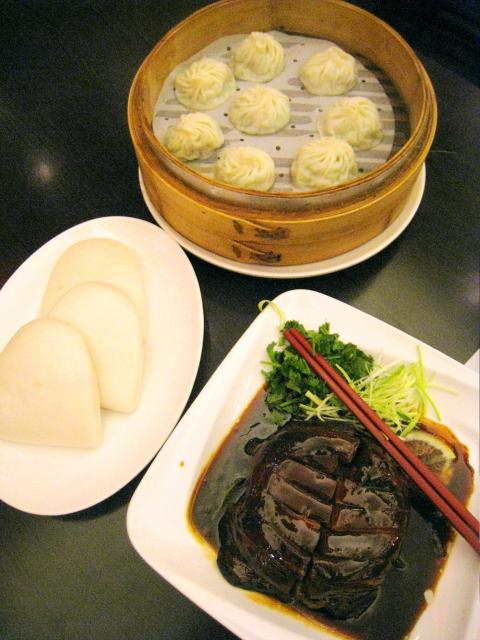The dull, concrete National Taiwan University Alumni Club (台大校友會館) building on Jinan Road (濟南路) doesn’t look like it would house a restaurant boasting an acclaimed menu of Jiang-Zhe (short for China’s Jiangsu and Zhejiang provinces) cuisine and Shanghai-style snacks at wallet-friendly prices.
Su Hung Restaurant (蘇杭餐廳) teems with office workers and suit-clad officials from the nearby Ministry of Education (教育部) and Legislative Yuan (立法院) on weekdays, and families and groups of friends on weekends. Reservations are recommended.
Despite its abundant banquet fare, the restaurant is best known for two things: its sponge gourd and shrimp soup dumplings (絲瓜蝦仁湯包, NT$280 for eight) and scallion pancakes (蔥油餅, NT$90). Both can be found in the menu’s snack section. Although the latter seems to be simple street nosh that doesn’t demand much culinary skill, Su Hung impresses by frying the pancake so the surface is scrumptiously crisp and the inside juicy.

Photo: Ho Yi, Taipei Times
With skin that was a little dry and less broth than run-of-the-mill xiaolongbao (小籠包), I was slightly disappointed by the sponge gourd and shrimp dumplings. The natural sweetness of the chopped sponge gourd, however, complemented the minced shrimp well.
All items on the menu’s snack section are currently being sold at half price. (The prices in this review have not been discounted.)
Another signature dish is the braised pork in honey sauce (東坡肉, NT$360), which is tucked in a steamed bun (刈包, NT$20 for one) like a hamburger.
The braised fish belly in soy sauce (紅燒肚膛, NT$240) melts in the mouth and is glazed with a sweet dressing. For soup, the braised tofu with Chinese cabbage served in a clay pot (砂鍋白菜豆腐, NT$280) is a delightfully subtle concoction of clam, tofu, Chinese cabbage, mushroom, shrimp, ham and pork intestine.
Other highlights include the braised crab eggs with tofu (蟹黃豆腐, NT$220), braised pork with bacon, tofu and bamboo shoot served in a clay pot (砂鍋醃篤鮮, NT$380) and braised duck, bamboo and ham soup (杭州老鴨煲, NT$1,280 — must be preordered at least one day in advance).
Service is adequate but a little slow when the restaurant is full. Still, the dining experience is generally pleasant as the space is designed for comfort, with gallery lighting, spacious seating and a neat interior that could be described as modern Chinese chic.
Su Hung is ideal for a family meal that won’t break the bank. It also operates branches in Sindian (新店) and Tianmu (天母). For more information, visit www.suhung.com.tw.

US President Donald Trump may have hoped for an impromptu talk with his old friend Kim Jong-un during a recent trip to Asia, but analysts say the increasingly emboldened North Korean despot had few good reasons to join the photo-op. Trump sent repeated overtures to Kim during his barnstorming tour of Asia, saying he was “100 percent” open to a meeting and even bucking decades of US policy by conceding that North Korea was “sort of a nuclear power.” But Pyongyang kept mum on the invitation, instead firing off missiles and sending its foreign minister to Russia and Belarus, with whom it

Many people noticed the flood of pro-China propaganda across a number of venues in recent weeks that looks like a coordinated assault on US Taiwan policy. It does look like an effort intended to influence the US before the meeting between US President Donald Trump and Chinese dictator Xi Jinping (習近平) over the weekend. Jennifer Kavanagh’s piece in the New York Times in September appears to be the opening strike of the current campaign. She followed up last week in the Lowy Interpreter, blaming the US for causing the PRC to escalate in the Philippines and Taiwan, saying that as

When Taiwan was battered by storms this summer, the only crumb of comfort I could take was knowing that some advice I’d drafted several weeks earlier had been correct. Regarding the Southern Cross-Island Highway (南橫公路), a spectacular high-elevation route connecting Taiwan’s southwest with the country’s southeast, I’d written: “The precarious existence of this road cannot be overstated; those hoping to drive or ride all the way across should have a backup plan.” As this article was going to press, the middle section of the highway, between Meishankou (梅山口) in Kaohsiung and Siangyang (向陽) in Taitung County, was still closed to outsiders

The Chinese Communist Party (CCP) has a dystopian, radical and dangerous conception of itself. Few are aware of this very fundamental difference between how they view power and how the rest of the world does. Even those of us who have lived in China sometimes fall back into the trap of viewing it through the lens of the power relationships common throughout the rest of the world, instead of understanding the CCP as it conceives of itself. Broadly speaking, the concepts of the people, race, culture, civilization, nation, government and religion are separate, though often overlapping and intertwined. A government